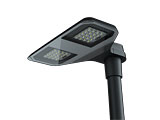Philips Lighting launches new LED family of street lights futureproofed by design for Internet of Things age
March 10, 2016
Frankfurt, Germany – Philips Lighting, a Royal Philips (NYSE: PHG, AEX: PHIA) company and global leader in lighting, today announced the Philips DigiStreet range of road and street lighting luminaires that are designed to bring energy saving LED lighting to cities while giving them the option to migrate to connected street lighting when they are ready. Philips DigiStreet comes in a range of forms and optics to satisfy various lighting needs of cities and urban areas. Each luminaire’s specification is uniquely identified via the QR code on the Philips Service tag, enabling smartphone access for easy commissioning and maintenance information. Philips DigiStreet uses the latest LED lighting technology which typically brings energy savings of around 40% compared to conventional street lighting from day one. Furthermore, high quality LED light improves the livability of cities, providing the right light to make streets brighter and safer. Philips DigiStreet luminaire is equipped with the option to connect the street light. A socket on top of the luminaire enables a Philips CityTouch connector node to be added. This plug-and-play node enables wireless connection to the Philips CityTouch street lighting management system. With this upgrade, the street light can be monitored, controlled and managed remotely. Typically, this provides an additional 30% energy saving on top of the 40% saving achieved by switching to LED. Maintenance cost and time are also reduced as real-time information on the status of each light point is relayed to the operator who can troubleshoot remotely or schedule crews to a precise location. No more driving around looking for faults. Philips CityTouch system also offers a complete workflow management application to manage all lighting assets effectively. Philips DigiStreet luminaire is also “sensor ready.’’ It comes with a universal socket on the bottom of the luminaire which enables a sensor to be added. Sensor applications could include a motion detector so that light is dimmed when no-one is around; parking sensors to monitor the availability of parking slots on the road; sensors to monitor traffic density, air quality, etc. Already built into Philips DigiStreet luminaires is the Philips Xitanium Sensor Ready Driver which enables a wide variety of sensors to work when connected with the luminaire. “Different towns and cities have different needs and whilst the switch to LED lighting is taking place all over the world, not every municipality is ready to go to connected lighting from day one. What Philips DigiStreet luminaire offers is a clear migration path.” said Vasanth Philomin, Public Segment Leader, Business Professional Systems Philips Lighting. “We believe Philips DigiStreet luminaire is ideally suited for municipal customers big and small, bringing energy saving LED lighting now and the ability to connect as and when ready to realize the benefits from using smart city technologies.” Philips DigiStreet luminaire offers a range of six different luminaires, including four road specific luminaires, which offer between 1,000 and 30,000 lumens. The range meets a large variety of lighting needs from main roads to narrow paths, plaza and pedestrian areas, providing a variety of optics, while maintaining a consistent look and feel. It comes with best in class LED performance to ensure each luminaire provides the most optimized efficacy . New Philips Service tag Philips DigiStreet luminaire will be available for shipping to European markets from September 2016. For a demo please visit Philips Lighting’s stand at Light + Building, in Frankfurt, March 13-18, 2016.
Philips DigiStreet luminaire also features the new Philips Service tag which simplifies installation and onsite maintenance. The tag is located on the bottom of the pole and contains information unique to the luminaire, such as product specification, configuration settings and maintenance details. The information is accessed by a smartphone by simply scanning the Philips Service tag’s QR code. Using the smartphone app an engineer may also identify and order spare parts and even program them onsite using NFC technology. For example, if a maintenance engineer installs a driver they ordered, they may need to program it to the factory settings of the individual luminaire. Using the service tag app, they can recall the settings then simply place their smartphone on the driver, and press «program».
For further information, please contact:
Eeva Raaijmakers
Philips Lighting
Tel: +31612350597
Email: eeva.raaijmakers@philips.com
About Philips Lighting
Philips Lighting, a Royal Philips (NYSE: PHG, AEX: PHIA) company, is the global leader in lighting products, systems and services. Our understanding of how lighting positively affects people coupled with our deep technological know-how enable us to deliver digital lighting innovations that unlock new business value, deliver rich user experiences and help to improve lives. Serving professional and consumer markets, we sell more energy efficient LED lighting than any other company. We lead the industry in connected lighting systems and services, leveraging the Internet of Things to take light beyond illumination and transform homes, buildings and urban spaces. In 2015, we had sales of EUR 7.4 billion and employed 33,000 people worldwide. News from Philips Lighting is located at www.philips.com/newscenter



